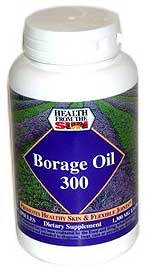| Home A B C D E F G H I J K L M N O P Q R S T U V W X Y Z |
|
Home |
Borage the Brave
Borage has long symbolized courage. In the Middle Ages ladies would embroider borage flowers on the scarves of knights about to go off to the crusades or to fight in a tournament. An old Latin saying, Ego Borage gaudia semper ago, means, “I, borage, always bring courage”. In the ancient world young girls would serve borage tea to shy and reluctant young men in an effort to get them to propose. Celtic warriors would add the herb to their wine to give them bravado before battle. Drinking borage today is supposed to induce psychic powers. The Roman writer, Pliny (AD 23-79) claimed that borage steeped in wine was the famous Nepenthe of Homer, which brought absolute forgiveness when drunk. 
The origin of the word borage is uncertain, but it probably derives from the Latin, borra, meaning “hair of the beast”, a reference to the herb’s bristly leaves. Medicinally, borage has high mucilage content, making it a demulcent and a soother of respiratory problems. Its emollient qualities make it helpful for sore and inflamed skin — prepared either as freshly squeezed juice, in a poultice, or as an infusion. The flowers encourage sweating, and the leaves are diuretic. Borage seed oil is one of the best dietary sources of gamma linolenic acid (GLA), one of the essential fatty acids. The essential fatty acids are important in many metabolic processes, including energy production. They are called “essential” fatty acids because your body cannot synthesize them. They must be part of your diet. A lack of GLA in the diet has been linked to many modern ailments including arthritis, skin problems and migraine headaches. Borage also acts as a restorative on the adrenal cortex, which means that it will revive and renew the adrenal glands after a medical treatment with cortisone or steroids. In addition to the healthful qualities of its oil, borage is a very nutritious herb, rich in calcium, magnesium and vitamins A and C. Borage is a European native, but now grows extensively throughout North America. It is becoming an important cash crop on the Prairies where it is cultivated for its seed oil. The herb is a self-seeding annual (although it will occasionally appear as a biennial) so once in your garden it’s probably there to stay. But it’s a welcome plant, being both attractive and useful. The flowers are a beautiful bright blue and star-shaped. Borage is easily grown from seed and will flourish in full sun or light shade. Borage is a favorite flower of bees. Borage has a crisp, cucumber-like flavor and will enhance the taste of salads, vegetable, fish and poultry. Choose young leaves, as they tend to get bristly with age. The older leaves can be used for flavoring a soup or stew, but it’s recommended that they be removed from the dish before serving. Borage, Fennel, and Radish Salad · 1 fennel bulb, with top and outer portions removed, cut into thin slices Bruce Burnett is a Chartered Herbalist, an award-winning writer and author of the best-selling book HerbWise: growing cooking wellbeing. Bruce and his wife Delaine own HerbWise Products Inc., making their own line of herbal skin therapy soaps, salves, sprays and other all-natural herbal body care products. Contact Bruce through the HerbWise website: http://www.herbwiseproducts.com. |
||
|
|
||
|
Glossary References Links Contact
|